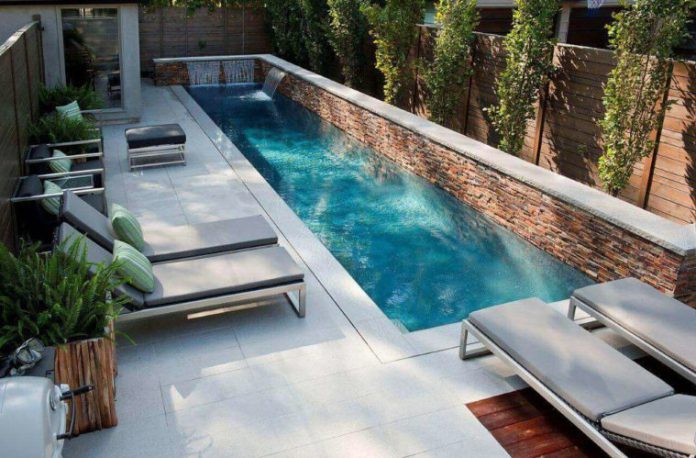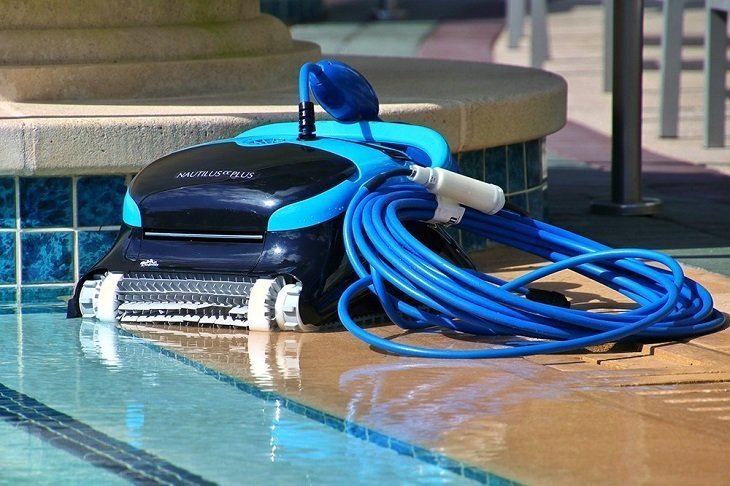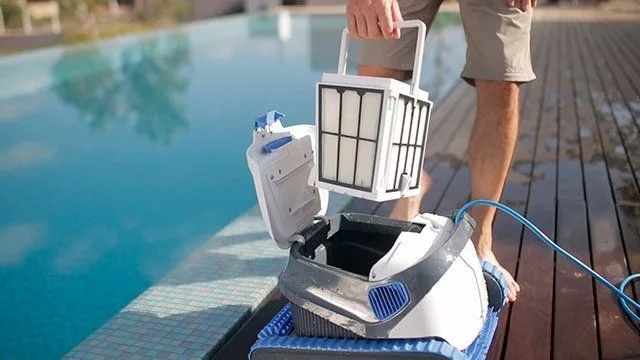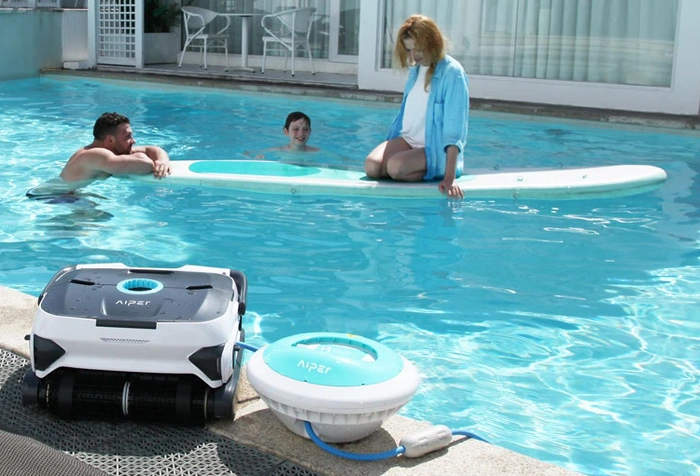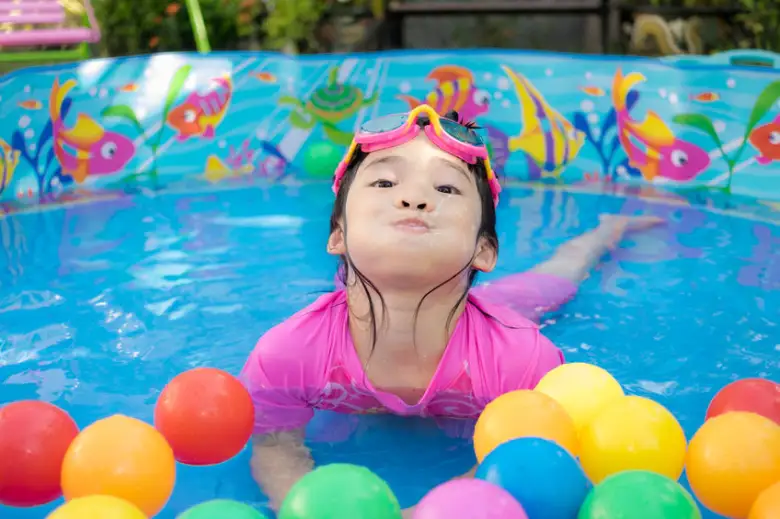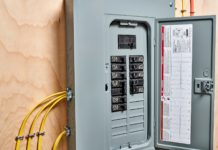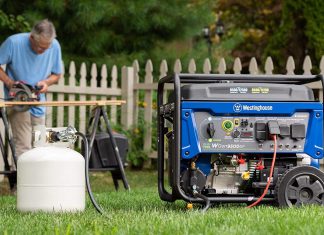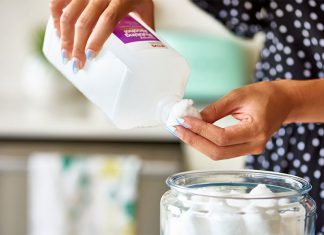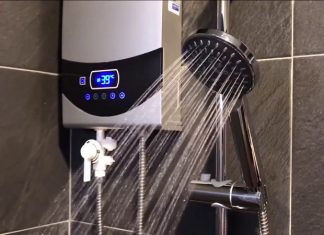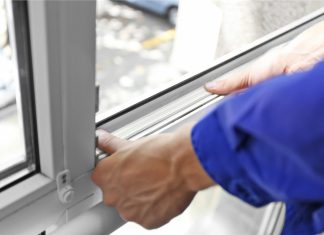Among the choice of pool cleaners, a robotic pool cleaner or a pool vacuum robot is your best bet to clear away pollution and debris even in a small pool.
Swimming pools are like dogs; whether you have a chihuahua, a bulldog, or a husky, they all need regular maintenance. The only difference is the level of upkeep necessary for each breed. Chihuahuas are relatively low-maintenance breeds, while huskies are considered high-maintenance.
In the world of swimming pools, the same rule holds true. If you have a big pool, it’s like having huskies or Labradors– you have to follow regular, high-effort maintenance to keep them in the best condition. On the other hand, having a small pool does not require much upkeep. It still needs effort, but the hassle and work involved are minimal.
So, how do you clean a small pool? As they say, there are many ways to skin a cat, and this article endeavors to include the best and most common ways to clean a small pool. No one wants their children to have explosive diarrhea or develop embarrassing skin rashes, so parents may want to take special note of these suggestions.
Why Clean Even A Small Swimming Pool?
Most of us are ignorant of the lurking dangers even in a small swimming pool. After all, only family members and kids use it, right? Wrong! Whenever there’s water, there is always something swimming, or worse, breeding in there that could cause various skin, ear, and gastrointestinal diseases.
You can even make a case about small swimming pools needing more cleaning than the larger ones. Why? Because most small swimming pools operate without pumps and filters, they are basically just ponds of water in the backyard that invite foreign material that may cause diseases.
Of course, your kids and family members are more susceptible to bacteria if you let other kids and families use the pool. On the contrary, it’s much safer if you use the pool exclusively, but that doesn’t mean contracting water-borne diseases won’t happen. No, we’re not suggesting to keep all the fun to yourselves and never share the pool with others. It’s just that it’s always a good idea, no matter how tiresome it may be, to clean even small swimming pools.
Using a Robotic Pool Cleaner to Clean Small Pools
Robotic pool cleaners can handle pools of any size, but some models are specifically designed for small pools. The shared features of robot cleaners for small pools are their portability, shorter cords, and, like music to everyone’s ears, affordability (compared to robot cleaners for larger pools, that is).
The best thing about robot pool cleaners is that you barely have to do anything. It’s as simple as lifting it out of the box, connecting it to a power source, turning it on, and submerging it into the water. Among these robotic cleaners, the maytronics dolphin stands out for its reliability and superior cleaning power. After a little over an hour, expect these machines to have already done their job!
Best Robot Cleaners for Small Pools
- Dolphin S50
The Dolphin S50 is exclusively a pool floor cleaner. But as anyone with a swimming pool knows, pool floors are the hardest part to clean. It is lightweight, compact, safe to use, and ideal for above-ground and small pools with a maximum of eight meters in length.
- Dolphin E10
The Dolphin E10 has a version that could clean pools of up to 30 meters in length, but there’s also one meant for smaller above-ground pools. Like the S50, it is primarily a floor scrubber, but has a quick water release system and requires simple maintenance.
- Dolphin E20
Unlike the S50 and E10 models, the E20 does not only clean floors, it takes care of the pool walls, too! It could do quick work of any above-ground pool or in-ground pools of up to 10 meters in length. Think of it as an advanced version of the E10, one that packs a technological punch, but is a better cleaner overall.
- Aiper Cordless
Now, if you do not like the idea of entangled cords around your swimming pool, the answer is to go cordless. The Aiper Cordless Robotic Cleaner is probably the most lightweight option out there, tipping the scales at 6 pounds. When it’s time to see the Aiper Cordless in action, you don’t need to do much. Simply drop into the pool and wait for it to finish. It has a self-parking technology that makes it stop whenever it finishes a cleaning cycle or if it’s running out of battery. When you’re finished, use the included retrieval hook to pull it out of the water without getting wet. Neat, right?
- Dolphin S200
The other Dolphin models are ideal for small pools of up to 8 or 10 meters in length. The S200, however, can handle 12-meter pools without any difficulty. It is both an active floor cleaner and a wall scrubber, cleaning walls, floors, and waterline inside its two-hour cycle. It’s no doubt a great choice if you have a slightly larger pool.
For more questions about robotic pool vacuums and cleaners, check out this great FAQ section for some excellent information.
What About Kiddie Pools?
Using a robotic pool cleaner on a kiddie is such overkill, but cleaning them is a must like any other pool. The thing about kiddie pools is that there is no one way to ensure it’s safe. It’s always a combination of different things and may also depend on the circumstances. So, what are some of the ways to clean a kiddie pool?
- Drain and Refill
Unless your place is experiencing a drought of Biblical proportions, a small kiddie will simply need to be drained and refilled. After every use, drain the used water, scrub down the pool, and refill it with water when used again. Or, if you don’t want to waste all that water, use it for the plants or to power wash the driveway.
- Skim the pool every day
If the kiddie pool is slightly larger and wasting all that water after every use is not an option, skimming the pool surface must be done religiously. It won’t take as long as working on large pools, but it’ll keep the water clean and tidy. You may skim the pool before and after the kids use it for better results. Make sure to collect all debris in a bag since placing it somewhere in the yard may end up back in your pool. Yikes! When you’re at it, be sure to clean the skimmer net on a regular basis as well.
- Cover the pool when not in use
This is pretty self-explanatory. Cover it if you don’t want leaves and other debris to camp in the kiddie pool. Whenever possible, choose a cover that shields the pool against rain because, as we all know, rain can quickly turn the pool into an algae factory. Make sure that the corners are shut tight and secure them with something heavy like a brick to prevent the cover from being blown off.
- Properly sanitize
Pool chemicals are still necessary when using large inflatable pools. The rule of thumb here is to balance the chemicals in proportion to the amount of water your kiddie pool holds up. Some inflatable pools have a capacity of 200 up to 4,000 gallons of water. In such cases, you will need to disinfect the water with a mixture of chlorine, algaecide, and bleach in the proper amounts. These are necessary to maintain clean water at all times.
- Use a manual pool vacuum
Skimming is just the beginning of pool upkeep. There is still little gunk and whatnot that makes their way to the bottom of the pool. That’s when you need to use a vacuum to suck them out. Again, it wouldn’t take long, but it’s still necessary to ensure a safe swimming environment for the kids.
Conclusion
Maintaining a small pool isn’t nearly as tormenting as caring for a large one, but don’t be overconfident. Small pools still need regular cleaning and upkeep, not only for aesthetic purposes, but, more importantly, for the safety of our family members.
The good news is that it really doesn’t have to be a hassle. There are robotic pool cleaners designed especially for small pools. These machines are self-contained and practically move independently as they clean your small pool within 90 minutes.
What about kiddie pools? Then it’s much easier to maintain them! Depending on the size of these pools, you may either drain and refill them every use or use sanitizing pool chemicals. Either way, never take any chances when it comes to the health of your kids and family.
